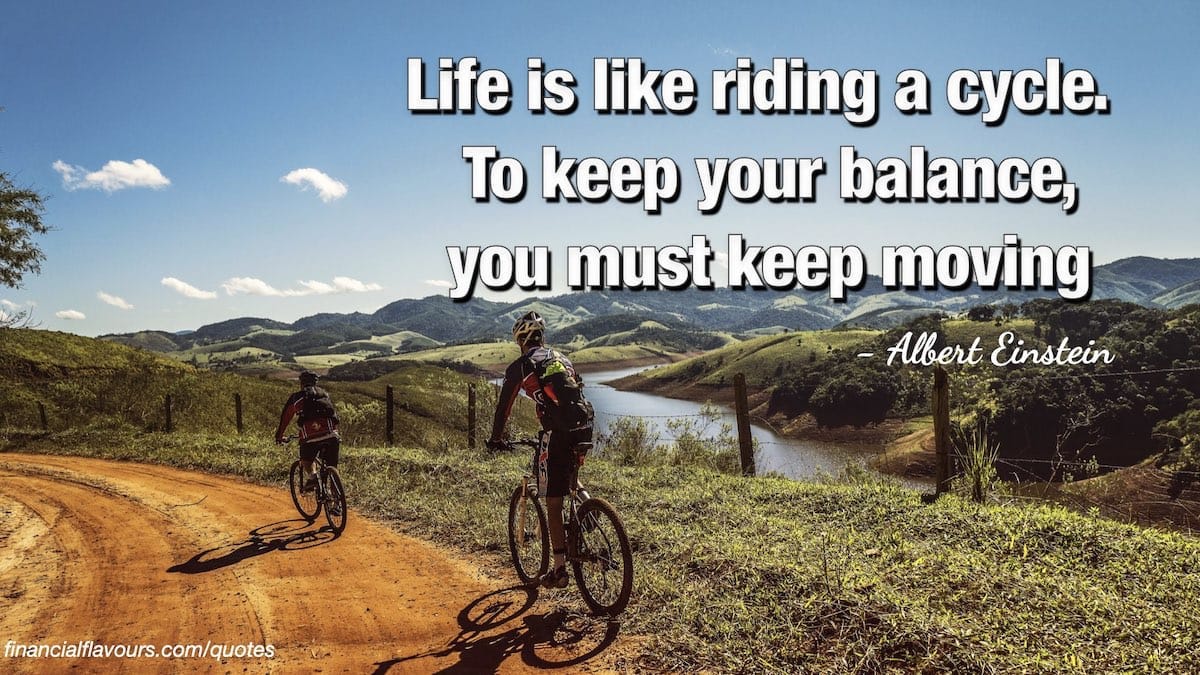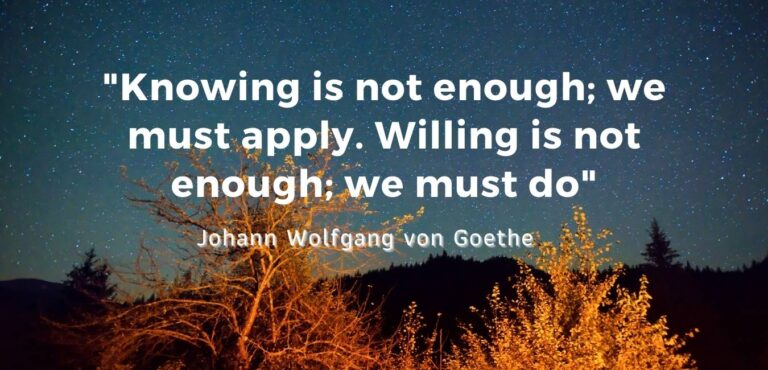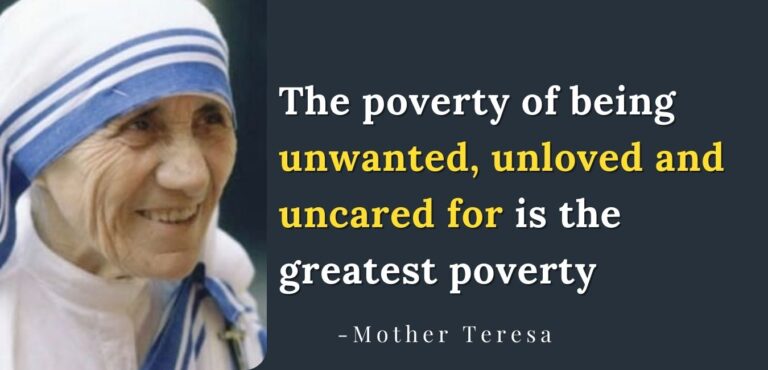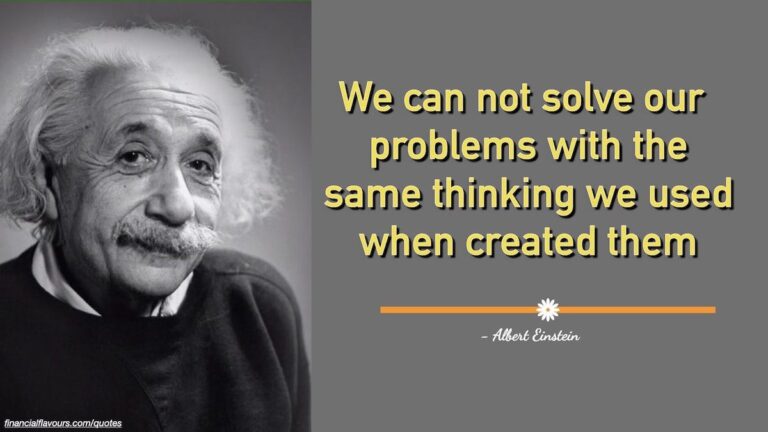100 Powerful Albert Einstein Quotes That Will Change Your Perspective
Albert Einstein, one of the most renowned intellectuals of the 20th century, has left us with a wealth of wisdom through his profound and thought-provoking quotes. His insights into life, knowledge, and the human condition have inspired countless individuals around the world. In this blog post, we present the 100 Powerful Albert Einstein Quotes That Will Change Your Perspective, exploring his unique perspectives on topics such as creativity, success, intelligence, and human values. Whether you are looking for Albert Einstein quotes about life and success, inspirational Einstein quotes on creativity, or wisdom from Albert Einstein on knowledge and imagination, this collection aims to provide you with valuable insights and reflections. Discover how Einstein’s words continue to resonate and inspire in our exploration of these remarkable quotations.
On Life and Existence
1. “Life is like riding a bicycle. To keep your balance, you must keep moving.”
This quote emphasizes the importance of perseverance and continuous effort in life. Just as a bicycle needs constant motion to stay balanced, individuals must keep progressing despite challenges.
2. “The only source of knowledge is experience.”
Einstein underscores that true knowledge is gained through personal experiences rather than theoretical learning alone. Experiential learning offers deeper insights and understanding.
3. “The only way to escape the corruptible effect of praise is to go on working.”
This quote highlights the potential distractions of praise and the importance of maintaining focus on continuous work and effort.
4. “Try not to become a man of success, but rather try to become a man of value.”
Einstein encourages prioritizing personal values and contributions over mere success. Creating lasting impact through one’s actions and character is more meaningful.
5. “Weakness of attitude becomes weakness of character.”
Here, Einstein reflects on how one’s mindset influences their character. A negative or weak attitude can diminish personal strength and integrity.
6. “Knowledge and ego are directly related. The less knowledge, the greater the ego.”
Einstein points out that a lack of knowledge often leads to a larger ego. Increased understanding tends to foster humility and reduce arrogance.
7. “The true sign of intelligence is not knowledge but imagination.”
Einstein emphasizes that imagination is a more accurate measure of intelligence than mere knowledge. Creativity and vision are crucial for innovation.
8. “In the middle of every difficulty lies opportunity.”
This quote suggests that challenges often present chances for growth and progress. Embracing difficulties can lead to valuable opportunities.
9. “Look deep into nature, and then you will understand everything better.”
Einstein highlights the profound insights that can be gained from observing and understanding nature. Nature provides fundamental truths and clarity.
10. “Mankind invented the atomic bomb, but no mouse would ever construct a mousetrap.”
Here, Einstein reflects on the irony of human inventions. While humans create complex and destructive technologies, even simple solutions like a mousetrap are not invented by animals.
On Knowledge and Learning
11. “The more I learn, the more I realize how much I don’t know.”
This quote reflects the ever-expanding nature of knowledge. Learning reveals the vastness of what remains unknown, encouraging ongoing inquiry.
12. “All religions, arts and sciences are branches of the same tree.”
Einstein believes that diverse fields such as religion, art, and science are interconnected aspects of the same fundamental pursuit of understanding and truth.
13. “I have no special talent. I am only passionately curious.”
Einstein attributes his achievements to a deep curiosity rather than innate talent. Passionate inquiry drives his pursuit of knowledge.
14. “Everything should be as simple as it is, but not simpler.”
This quote advocates for simplicity in explanation and understanding, cautioning against oversimplification that may distort meaning.
15. “If you can’t explain it simply, you don’t understand it well enough.”
Einstein stresses the importance of clarity in communication. A thorough understanding should enable one to convey complex ideas in a straightforward manner.
16. “Creativity is intelligence having fun.”
Einstein views creativity as an enjoyable expression of one’s intellect, highlighting the playful aspect of applying intelligence to innovative endeavors.
17. “Information is not knowledge.”
Here, Einstein distinguishes between raw data and meaningful understanding. True knowledge involves comprehending and integrating information rather than just possessing it.
18. “Intellectuals solve problems, geniuses prevent them.”
Einstein differentiates between problem-solving and prevention. While intellectuals address issues, geniuses foresee and avoid them, reflecting higher-level foresight.
19. “Success comes from curiosity, concentration, perseverance, and self-criticism.”
This quote outlines the key components of success: a curious mind, focused effort, persistence, and the ability to critically evaluate oneself.
20. “I’d rather be an optimist and a fool than a pessimist and right.”
Einstein expresses a preference for optimism, even if it means being wrong, over pessimism. An optimistic outlook fosters a more hopeful and proactive attitude.

On Science and Curiosity
21. “A person who never made a mistake never tried anything new.”
This quote encourages embracing mistakes as part of the learning process. Innovation and growth require experimentation and accepting the possibility of errors.
22. “The more I study science, the more I believe in God.”
Einstein reflects on how scientific exploration can deepen one’s sense of spirituality and belief in a higher power, linking science and faith.
23. “If you can’t explain it to a six-year-old, you don’t understand it yourself.”
Einstein emphasizes the need for clear and simple explanations, suggesting that true understanding enables one to communicate ideas to anyone, regardless of age.
24. “Never memorize something that you can look up.”
This quote advises against rote memorization of information that can be easily accessed. Instead, focus on understanding concepts and applying knowledge.
25. “If we knew what it was we were doing, it would not be called research, would it?”
Einstein highlights the exploratory nature of research. True research involves venturing into the unknown and discovering new insights without prior knowledge.
26. “I speak to everyone in the same way, whether he is the garbage man or the president of the university.”
This quote reflects Einstein’s egalitarian approach to interactions. He values treating all individuals with the same respect, regardless of their status.
27. “If I were not a physicist, I would probably be a musician. I often think of music. I live my daydreams in music. I see my life in terms of music.”
Einstein reveals his deep connection to music and how it influences his worldview. Music is a significant aspect of his life and imagination.
28. “The important thing is not to stop questioning. Curiosity has its own reason for existing.”
Einstein advocates for maintaining a sense of wonder and continuous inquiry. Curiosity drives exploration and understanding.
29. “A clever person solves a problem. A wise person avoids it.”
This quote distinguishes between solving problems and avoiding them. Wisdom involves foresight and preventive measures rather than merely addressing issues.
30. “Success comes from curiosity, concentration, perseverance, and self-criticism.”
Einstein outlines the essential qualities for achieving success: curiosity, focus, persistence, and the ability to critically evaluate oneself.
On Wisdom and Insight
31. “The true sign of intelligence is not knowledge but imagination.”
Einstein emphasizes that imagination is a better measure of intelligence than knowledge alone. Creativity and visionary thinking are crucial for genuine intelligence.
32. “In the middle of every difficulty lies opportunity.”
This quote suggests that challenges often present opportunities for growth and progress. Embracing difficulties can lead to valuable outcomes.
33. “Look deep into nature, and then you will understand everything better.”
Einstein believes that understanding nature provides deeper insights into various aspects of life and existence.
34. “Mankind invented the atomic bomb, but no mouse would ever construct a mousetrap.”
Einstein reflects on the irony of human inventions, noting that while humans create complex technologies, even simple solutions are beyond the capability of animals.
35. “The more I learn, the more I realize how much I don’t know.”
This quote illustrates the expanding nature of knowledge and the recognition of one’s own limitations, fostering a continuous quest for learning.
36. “All religions, arts and sciences are branches of the same tree.”
Einstein sees various disciplines as interconnected branches of a single pursuit of truth and understanding.
37. “I have no special talent. I am only passionately curious.”
Einstein attributes his success to curiosity rather than inherent talent, highlighting the role of a passionate inquiry in his achievements.
38. “Everything should be as simple as it is, but not simpler.”
Einstein advocates for simplicity in explanations, cautioning against oversimplification that can lead to distortion.
39. “If you can’t explain it simply, you don’t understand it well enough.”
The need for clear, simple explanations reflects a deep understanding of a concept. True comprehension allows for straightforward communication.
40. “Creativity is intelligence having fun.”
Einstein views creativity as an enjoyable application of intelligence, highlighting the playful aspect of innovative thinking.
On Perspective and Understanding
41. “Information is not knowledge.”
Einstein differentiates between raw data and meaningful understanding, emphasizing that knowledge involves integrating and comprehending information.
42. “Intellectuals solve problems, geniuses prevent them.”
This quote distinguishes between solving problems and preventing them, suggesting that geniuses have a higher level of foresight and wisdom.
43. “Success comes from curiosity, concentration, perseverance, and self-criticism.”
Einstein outlines key elements for success, including curiosity, focused effort, persistence, and the ability to critically assess oneself.
44. “I’d rather be an optimist and a fool than a pessimist and right.”
Einstein prefers optimism over pessimism, even if it means being wrong. A hopeful outlook fosters positive actions and attitudes.
45. “A clever person solves a problem. A wise person avoids it.”
This quote emphasizes wisdom as the ability to foresee and avoid problems rather than merely addressing them.
46. “If you can’t explain it to a six-year-old, you don’t understand it yourself.”
Einstein stresses the importance of simplicity in explanations, reflecting a true understanding of complex ideas.
47. “Never memorize something that you can look up.”
This quote advises against memorizing information that can be easily accessed, promoting understanding and practical application instead.
48. “If we knew what it was we were doing, it would not be called research, would it?”
Einstein highlights the exploratory nature of research, which involves discovering new insights without prior knowledge.
49. “I speak to everyone in the same way, whether he is the garbage man or the president of the university.”
Einstein values treating everyone with equal respect, regardless of their social status or profession.
50. “If I were not a physicist, I would probably be a musician. I often think of music. I live my daydreams in music. I see my life in terms of music.”
Einstein expresses his deep connection to music and how it influences his perspective on life.
On Human Nature and Society
51. “I would teach peace rather than war. I would inculcate love rather than hate.”
Einstein advocates for teaching and promoting peace and love over conflict and hatred, reflecting his commitment to human values.
52. “The important thing is not to stop questioning. Curiosity has its own reason for existing.”
Einstein emphasizes the value of curiosity and continuous questioning as essential components of intellectual and personal growth.
53. “A person who never made a mistake never tried anything new.”
This quote encourages embracing mistakes as part of the learning and innovation process.
54. “If you can’t explain it simply, you don’t understand it well enough.”
Einstein stresses that true understanding enables one to communicate complex ideas in a clear and straightforward manner.
55. “I have no special talent. I am only passionately curious.”
Einstein attributes his achievements to a deep curiosity rather than inherent talent, underscoring the importance of passionate inquiry.
56. “Everything should be as simple as it is, but not simpler.”
Einstein advocates for simplicity in understanding and explanation, cautioning against oversimplification.
57. “Creativity is intelligence having fun.”
Einstein views creativity as a playful expression of intelligence, highlighting the enjoyable aspect of innovative thinking.
58. “Information is not knowledge.”
Einstein differentiates between raw data and meaningful understanding, emphasizing the need for integration and comprehension.
59. “Intellectuals solve problems, geniuses prevent them.”
This quote distinguishes between problem-solving and prevention, suggesting that geniuses have a higher level of foresight and wisdom.
60. “Success comes from curiosity, concentration, perseverance, and self-criticism.”
Einstein outlines essential elements for achieving success, including curiosity, focus, persistence, and self-reflection.
On Personal Philosophy and Attitude
61. “I’d rather be an optimist and a fool than a pessimist and right.”
Einstein prefers an optimistic outlook over pessimism, even if it means being wrong. Optimism fosters hope and positive action.
62. “A clever person solves a problem. A wise person avoids it.”
This quote highlights wisdom as the ability to foresee and avoid problems rather than merely solving them.
63. “If you can’t explain it to a six-year-old, you don’t understand it yourself.”
Einstein underscores the importance of simplicity in communication, reflecting a true understanding of complex concepts.
64. “Never memorize something that you can look up.”
This quote advises against rote memorization of information that can be easily retrieved, emphasizing understanding and practical application.
65. “If we knew what it was we were doing, it would not be called research, would it?”
Einstein highlights the exploratory nature of research, which involves discovering new insights without prior knowledge.
66. “I speak to everyone in the same way, whether he is the garbage man or the president of the university.”
Einstein values treating all individuals with equal respect, regardless of their social or professional status.
67. “If I were not a physicist, I would probably be a musician. I often think of music. I live my daydreams in music. I see my life in terms of music.”
Einstein reflects on his love for music and how it influences his perspective on life and creativity.
68. “The only source of knowledge is experience.”
Einstein emphasizes that personal experience is the true source of knowledge, providing deeper understanding than theoretical learning.
69. “Try not to become a man of success, but rather try to become a man of value.”
This quote encourages focusing on personal values and contributions rather than just achieving success.
70. “Weakness of attitude becomes weakness of character.”
Einstein reflects on how a negative attitude can weaken one’s character, underscoring the importance of a positive mindset.
On Innovation and Discovery
71. “Knowledge and ego are directly related. The less knowledge, the greater the ego.”
Einstein notes that a lack of knowledge often results in a larger ego, while greater understanding tends to foster humility.
72. “The true sign of intelligence is not knowledge but imagination.”
This quote highlights imagination as a key indicator of intelligence, suggesting that creativity and visionary thinking are crucial.
73. “In the middle of every difficulty lies opportunity.”
Einstein sees challenges as opportunities for growth and advancement, encouraging a positive approach to obstacles.
74. “Look deep into nature, and then you will understand everything better.”
Observing and understanding nature provides deeper insights into various aspects of existence.
75. “Mankind invented the atomic bomb, but no mouse would ever construct a mousetrap.”
Einstein reflects on the irony of human inventions, noting that while complex technologies are created by humans, even simple solutions are beyond animals.
76. “The more I learn, the more I realize how much I don’t know.”
This quote illustrates the expanding nature of knowledge and the recognition of one’s limitations.
77. “All religions, arts and sciences are branches of the same tree.”
Einstein views diverse fields as interconnected aspects of a single pursuit of understanding.
78. “I have no special talent. I am only passionately curious.”
Einstein attributes his success to a deep curiosity rather than inherent talent.
79. “Everything should be as simple as it is, but not simpler.”
Einstein advocates for simplicity in understanding and explanation, cautioning against oversimplification.
80. “If you can’t explain it simply, you don’t understand it well enough.”
The ability to convey complex ideas in a simple manner reflects a deep understanding.
On Human Values and Ethics
81. “Creativity is intelligence having fun.”
Einstein views creativity as an enjoyable application of intelligence, emphasizing the playful aspect of innovative thinking.
82. “Information is not knowledge.”
This quote highlights the distinction between data and true understanding, emphasizing the need for integration and comprehension.
83. “Intellectuals solve problems, geniuses prevent them.”
Einstein differentiates between problem-solving and prevention, suggesting that geniuses have a higher level of foresight.
84. “Success comes from curiosity, concentration, perseverance, and self-criticism.”
Essential qualities for success include curiosity, focused effort, persistence, and self-reflection.
85. “I’d rather be an optimist and a fool than a pessimist and right.”
Einstein’s preference for optimism over pessimism fosters a hopeful and positive attitude.
86. “A clever person solves a problem. A wise person avoids it.”
Wisdom involves foreseeing and avoiding problems rather than merely solving them.
87. “If you can’t explain it to a six-year-old, you don’t understand it yourself.”
True understanding enables clear and simple explanations of complex ideas.
88. “Never memorize something that you can look up.”
Einstein advises against rote memorization, emphasizing understanding and practical application.
89. “If we knew what it was we were doing, it would not be called research, would it?”
Research involves exploring the unknown and discovering new insights.
90. “I speak to everyone in the same way, whether he is the garbage man or the president of the university.”
Equal respect for all individuals, regardless of status, is a core value.
91. “If I were not a physicist, I would probably be a musician. I often think of music. I live my daydreams in music. I see my life in terms of music.”
Einstein’s connection to music influences his perspective on life and creativity.
92. “The only source of knowledge is experience.”
Experience provides deeper understanding than theoretical learning alone.
93. “Try not to become a man of success, but rather try to become a man of value.”
Focusing on personal values and contributions is more meaningful than achieving success alone.
94. “Weakness of attitude becomes weakness of character.”
A negative attitude can weaken one’s character, highlighting the importance of a positive mindset.
95. “Knowledge and ego are directly related. The less knowledge, the greater the ego.”
Lack of knowledge often results in a larger ego, while understanding fosters humility.
96. “The true sign of intelligence is not knowledge but imagination.”
Imagination is a key indicator of intelligence, emphasizing the importance of creative thinking.
97. “In the middle of every difficulty lies opportunity.”
Challenges present opportunities for growth and advancement.
98. “Look deep into nature, and then you will understand everything better.”
Nature offers profound insights into various aspects of existence.
99. “Mankind invented the atomic bomb, but no mouse would ever construct a mousetrap.”
The irony of human inventions compared to the simplicity of animal solutions.
100. “The more I learn, the more I realize how much I don’t know.”
The expanding nature of knowledge and the recognition of one’s limitations.







